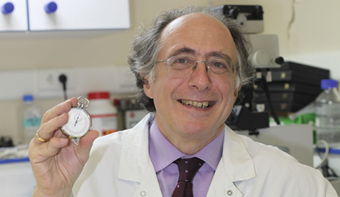Francis Levi is a Professor in Medical Oncology at the Warwick Medical School, UK.
Can you summarise your career path?
I became a medical doctor at the University of Paris (1976), then studied and practiced Chinese medicine, and passed an MD thesis on body clocks and cancer (1973). I worked as a general practicioner in France. I moved to develop my research at the University of Minnesota (USA) for 3 years. I graduated as a PhD (Paris, 1976), and was recruited as senior researcher (1982), then research director (1989) at the Centre National de la Recherche Scientifique. I specialised in Medical Oncology (1986), while implementing cancer chronotherapy at Paul Brousse hospital, a leading French cancer center. I led the first research unit on clocks and cancer at the National Institute for Health and Medical Research (INSERM) for 14 years. I co-founded the National Academy of Technology of France. I have published over 400 articles in peer-reviewed journals and coordinated 30 clinical trials and 5 EU projects. I am currently a Professor of Medical Oncology at Warwick Medical School since 2014.
Where do your best ideas emerge from?
I was puzzled by the possibility that biological rhythms could impact susceptibility to diseases and treatment effects, while I was studying Chinese medicine. I then wanted to investigate this using modern scientific tools, including mathematical modelling. The proper methodological approach to demonstrate the benefits of treatment timing in the clinics arose within workshops involving clinical colleagues from other fields. The integration of technology andsystems approaches to medical problems played a critical role through my interactions within the Academy of Technology of France, and the EU projects on Systems Biology/Medicine and ICT.
Who or what had or has had the strongest positive influence on your career and work?
My encounter with Chinese medicine led me to research on biological rhythms and cancer, at a time when circadian rhythms had just started to be uncovered. My work at the University of Minnesota for 3 years, with F Halberg and E Haus, both pioneers in the field, was critical for my training. Working with G Mathe, who founded Medical Oncology in Europe, was a great opportunity for me when I returned to France. Finally, the broad and tight international cooperations and personal exchanges with scientists and oncologists worldwide through EU or international clinical projects, as well as those with engineers and mathematicians within the Academy of Technology of France were essential for my work and career.
What do you consider the greatest challenge or hurdle for progress in your field?
To identify the main biological and lifestyle determinants for optimizing chronomodulated treatment delivery pattern in a given patient with a chronic disease. This is essential for personalising treatment in order to jointly enhance treatment tolerability and efficacy, a critical goal in cancer.
What are, in your opinion, the opportunities, directions or decisions that are vital to progress systems medicine?
Cancer medicine has often represented a driver for biomedical progress. Expectedly the integration of systems medicine in cancer management and treatment should play an important role. Multiscale modelling represents an opportunity to integrate biological clocks that drive anticancer drug metabolism and pharmacodynamic effects from cellular models to cancer patients, and to link them to circadian and other biomarkers. Information and Communication Technology is critical for providing the requested information and delivering treatment in real time.
Tell us what would have to happen in your work for you to say “A dream has come true!”?
The demonstration of a forecast system that results in high anticancer efficacy with no toxicity through personalised circadian-based treatment scheduling in patients.
If you could not be a scientist, what would you like to be?
An artist.
What was your greatest experience as a scientist?
Discovering that circadian timing of chemotherapy could more than double treatment tolerability and enhance efficacy as well, and its translation in the clinics. My first patient on high dose chronomodulated chemotherapy was angry at me because he thought I was treating him with placebo!
With which historical person, politician or celebrity would you like to have a dinner and discuss your work?
Anyone who wants to commit himself or herself to make a real investment in the field of systems approaches to circadian clocks. This is needed for improving the daily life of patients with cancer and chronic diseases, and curing some of them. All the current data support this goal is a realistic one today.
Would you be happy to share something about your private life and activities in your spare time?
My wife and I like travelling….Meeting with the family is most enjoyable and somewhat of a challenge, with our son living in the US and our daughter in Africa…
